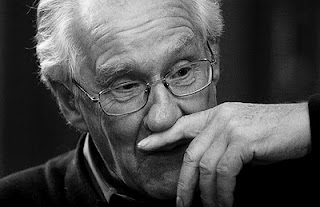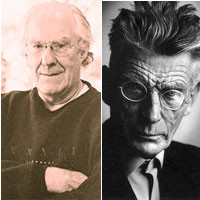by Tom Bair
But youth is also that fragment of existence when one easily imagines oneself to be quite singular, when really what one is thinking or doing is what will later be retained as the typical trait of a generation. Being young is a source of power, a time of decisive encounters, but these are strained by their all too easy capture by repetition and imitation. Thought only subtracts itself from the spirit of the age by means of a constant and delicate labour. It is easy to want to change the world – in youth these seems the least that one could do. It is more difficult to notice the fact that this very wish could end up as the material for the forms of perpetuation of this very world. This is
why all youth, as stirring as its promise may be, is always also the youth of a “young cretin.” Bearing this in mind, in later years, keeps us from nostalgia. — Alain BadiouAs we shake off a few days of dust and begin once again to move this examination around, pretend I am a serialized television program and that I must fill you on a few of the details, because you do not care to follow my story. You prefer the cleverness of an episode, and the overarching narratives are secondary if not tertiary. I am fine with this. As a matter of fact, I encourage this practice. It hides that I make it up as I go along, in accordance with the fan-mail.
On Wednesday we briefly peeped into Samuel Beckett’s career, and a described certain aesthetic linearity in Beckett’s work, beginning with Joyce’s decadent training, and then a trending toward aesthetic subtraction of ornament. The reasoning behind the Joyce-Beckett break is oft-speculated. Some site a personal decision in Beckett’s life to give-up alcohol, drugs, etc., and that this led to an aesthetic asceticism. Some point to ‘the dark’ of Krapp’s Last Tape and the general degradation endured by Beckett’s characters as devices which highlight and reinforce the poverty of language; its inability, whereas Joyce would instead flex its ability.
There is much that I am leaving unsaid about Beckett’s middle period, but as mentioned on Wednesday, the purpose of my mission is not to reexamine the terms, conditions, and consequences of Beckett’s work, but to use Beckett as an example of a writer who notoriously precedes himself; meaning: according to Alain Badiou, Beckett’s pubic identity has a habit of over-determining the reading of his actual work. Later in the course of this essay I will do some more dynamic thinking about my topic of reputation and publicity; for now, I will continue to use my examples to tweeze-out thought.
Last week I provided a link which excerpted “Tireless Desire,” an essay by Alain Badiou on the overall worth and substance of Beckett’s oeuvre. The block quote above is from this essay; it provides a frame of reference for Badiou’s Beckett (ie. a delicate, constant labor(er)), but also for the way Badiou reads his own reading of Beckett–  an encounter marked by the fervor and passion of youth. Yet in the quoted passage Badiou holds a warning over our heads, “It is easy to want to change the world … It is more difficult to notice the fact that this very wish could end up as the material for the forms of perpetuation of this very world.”
an encounter marked by the fervor and passion of youth. Yet in the quoted passage Badiou holds a warning over our heads, “It is easy to want to change the world … It is more difficult to notice the fact that this very wish could end up as the material for the forms of perpetuation of this very world.”
How is this relevant? Why have I allowed these ramblings about age to infiltrate an otherwise perfectly organized document? My answer: Badiou’s answer:
When I discovered Beckett, some years after the beginning of his French oeuvre (that is, around 1956), I was a complete and total Sartrean, though I was possessed by a question whose importance I thought I had personally discovered to have been underestimated by Sartre. I had yet to realise that it was already, and was going to be for a long while, the abiding obsession of my generation and of the ones to follow: the question of language.
Notice here that what is important is not only Badiou’s public identity (a
“complete and total Sartrean”), but also how he anticipates his personal contribution or alteration to that identity from within its parameters. More from this paragraph:
From such a makeshift observatory, I could only see in Beckett what everybody else did. A writer of the absurd, of despair, of empty skies, of also a ‘modern’ writer, in that the destiny of writing, the relationship between the endless recapitulation of speech and the original silence – the simultaneously sublime and derisory function of words – was entirely captured by the prose at a distant remove from any realist or representational intention. In such ‘modern’ writing, fiction is both the appearance of a story and the reality of a reflection on the work of the writer, on its misery and its grandeur.
Later in the essay, Badiou will consolidate the above description, naming it Beckett’s ‘caricature.’ Here, allow me a moment to think. What do we know? Badiou enters Beckett as a Sartrean and thus a scoundrel materialist. He notices that Sartre’s system has disregarded Language as a philosophical object, and believes himself to be the guy to investigate. Armed with his new tool, he comes to the same conclusion about Beckett that everyone does. How does he amend his error, and was he in error? For some camps of philosophical discourse, Badiou was not necessarily wrong, rather, he was young; his circle was a small one. Badiou thinks otherwise, “It took me many years to rid myself of this stereotype and at last to take Beckett at his word…. The lesson of Beckett is a lesson in measure, exactitude and courage.”
On Wednesday we will be sitting through that lesson.
Tags: Beckett Badiou, Joyce, Sartre





